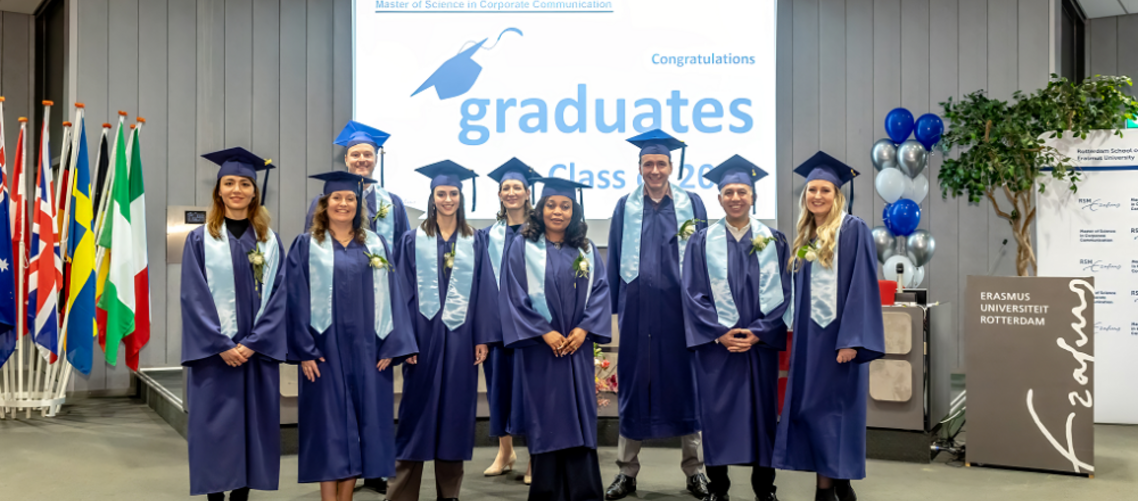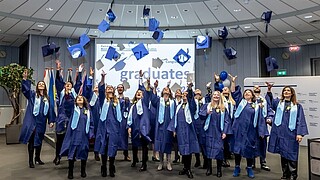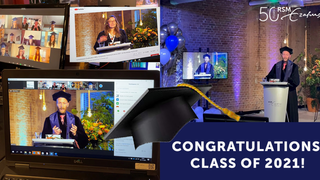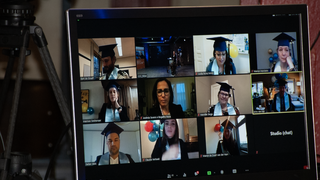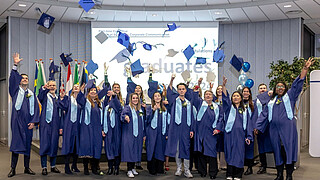Academic director Professor Joep Cornelissen, addressing the graduands, said: “This cohort is a group of 10 exceptional students and professionals, characterised by a thirst for knowledge and learning, real self-determination and resilience.”
Their theses were academically some of the strongest in recent years, he said. They are not just single-minded and hardworking, but they also care deeply about the profession and about each other, their peers, and the people around them.
Keynote speaker was Petra Beekmans van Zijll, Head of Global Communications at global semiconductor company Nexperia, who graduated from RSM’s MSc in Corporate Communications in 2019.
The 10 new graduates are: Gladys Afam-Anadu; Tareq Al Bitar; Claire Francois; Rima Kamal; Martijn van de Koolwijk; Melina Kotrotsou; Karin Ooms; Brandon Palmers; Peter Stanners; and Michelle Willemse. They all have senior positions in various sectors from corporates to governments, NGOs and education.
An evolving role
Petra Beekmans van Zijll’s message to the new graduates about an evolution in the role of corporate communications came from her experience of Nexperia’s buyout of a UK semiconductor facility. Nexperia was later ordered to sell it by the UK government because its owner was a company with Chinese shareholders. Through this process, she said she found it helpful to:
- Be informed – understand the environment and know your internal and external stakeholders
- Be prepared – develop content and Q&As for possible scenarios
- Be transparent – be factual, honest and authentic
- Be in time – align on who is doing what, for example by using detailed runbooks, the how-to guides for completing repeated procedures within a company.
She compared the function of corporate communications to that of the air traffic control tower at an airport, requiring the orchestration of operations, but having a wider scope that extends into other fields of communication, as well as requiring a deeper understanding of industries, technologies, policies and company strategy. The required response time for all communications professionals is getting shorter, she said but the role is becoming more integrated into all kinds of organisations and ‘closer to the C-suite’ – closer to the directors and board members. That’s why structure is so important – to more closely align and orchestrate the activities of an organisation.
Her final remarks were to highlight opportunities such as becoming involved in shaping company strategy and decision-making.
Special awards for theses
Two special awards were presented for the graduates’ theses. The abstracts from all of the 2023 theses have been collated in a report which can be read here.
The Prof. Cees van Riel Award for Impact and Excellence in Corporate Communication went to Karin Ooms for her thesis Engaging stakeholders in co-creation processes to drive environmental sustainability, a case study exploring stakeholder engagement through the lens of the Sustainable Flight Challenge. “This is a topic of both theoretical and practical significance, yet it remained under-researched. Her study of this question is truly admirable,” said the jury, and complemented her methodological approach and the rigorous social scientific approach that she took in answering her research question with a qualitative study and offers clear evidence that can be applied in practice. She graduated cum laude.
The jury gave an honourable mention to Rima Kamal for her thesis Best practices of sustainability - as told by corporate social media platforms.
The Andreas Innovation Award in Corporate Communication is for excellence in innovative thinking, the creation of new knowledge and the development of methods that bring out the best in organisations in the field of corporate communication. It was presented to Claire Francois for her thesis Preparing for and responding to a cyber attack: A Study on the Role of Communications Professionals. Claire focused on the emerging topic of cybersecurity and how it impacts modern organisations. Her intellectually strong thesis has significant implications for how corporate communicators can effectively prepare for and address cyberattacks on their organisations. The jury commended Claire for her detailed analysis of the topic, skilfully integrating information from a diverse range of sources. She also graduated cum laude.
The Jury gave an honourable mention to Michelle Willemse for her thesis: A smile is worth a thousand words: The role of internal communications in nurturing an emotional culture of joy at work.
Corporate communication programmes
The part-time Executive Master of Science in Corporate Communication (MCC) is developed by RSM’s Corporate Communication Centre. More than 1,300 business professionals from 30 countries and nationalities have completed short modules and workshops of the programme as short corporate training courses. More than 300 of them have graduated with an MSc in Corporate Communication.
